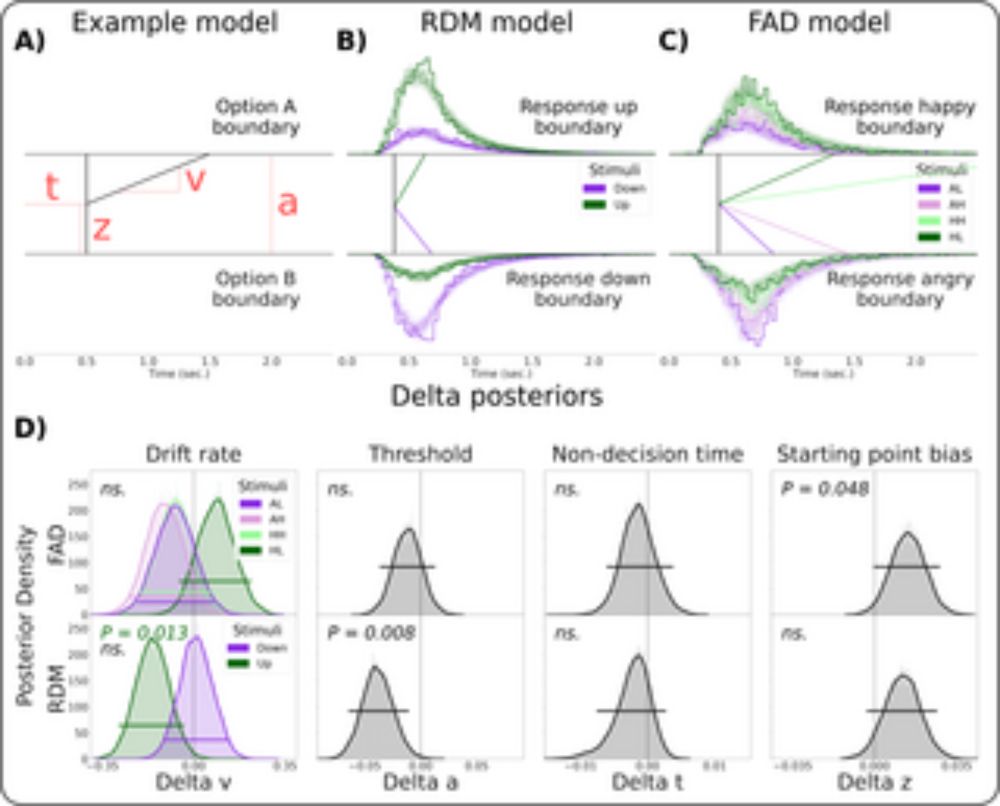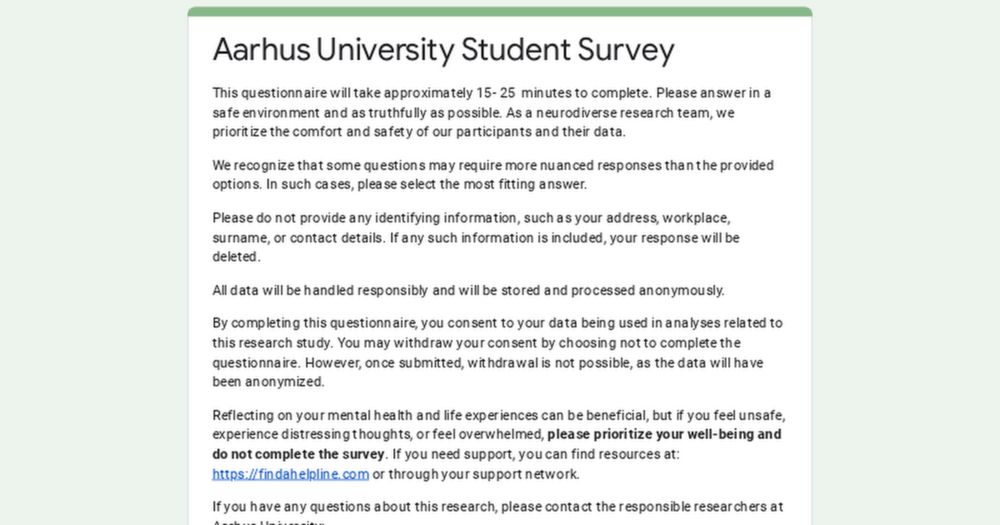
Some people gain confidence from thinking things through, others lose it – new research
Second-guessing yourself? Here’s how it can hurt (and at times help) your confidence.
A piece for The Conversation about our recent paper on two sources of confidence biases in people.
theconversation.com/some-people-...
In brief: Taking time to think about your decisions may either help or worsen underconfidence depending on whether it is related to gender or anxiety symptoms
01.02.2026 15:54 — 👍 2 🔁 0 💬 1 📌 0
With some trepidation, I'm putting this out into the world:
gershmanlab.com/textbook.html
It's a textbook called Computational Foundations of Cognitive Neuroscience, which I wrote for my class.
My hope is that this will be a living document, continuously improved as I get feedback.
09.01.2026 01:27 — 👍 582 🔁 237 💬 16 📌 10
Summer School - About — the MetaLab
We're running a 5th edition of the always-exciting UCL Summer School on Consciousness and Metacognition this year, 8th-10th July 2026 in London. Accommodation and travel expenses are covered.
For more information and how to apply, check out metacoglab.org/summer-schoo...
20.01.2026 17:07 — 👍 33 🔁 19 💬 0 📌 1
A nice write-up of our recent paper
15.01.2026 21:17 — 👍 0 🔁 0 💬 0 📌 0
Our computational model would also be useful to metacognition and computational psychiatry researchers 🤓. It simultaneously models dynamic metacognitive efficiency and 3 distinct sources of metacognitive bias, and has the potential to reveal the many different ways in which a person forms confidence
15.01.2026 21:13 — 👍 3 🔁 0 💬 0 📌 0
We hope this can aid future therapeutic interventions such that different people can adjust how they form confidence depending on the specific factors that distort their confidence ✨
15.01.2026 21:06 — 👍 0 🔁 0 💬 1 📌 0
We find that after making a decision, underconfidence in people with anxiety symptoms worsens with time, while it improves in women compared to men. Using a novel dynamic computational model of confidence, we show this is due to distinct computational sources of underconfidence!
15.01.2026 20:57 — 👍 2 🔁 0 💬 1 📌 0
We find that after making a decision, underconfidence in people with anxiety symptoms worsens with time, while it improves in women compared to men. Using a novel dynamic computational model of confidence, we show this is due to distinct computational sources of underconfidence!
15.01.2026 20:55 — 👍 1 🔁 0 💬 0 📌 0
Our new study led by @renzolanfranco.bsky.social out in PNAS showing an indistinguishable association between performance and awareness judgements when it comes to bodily self-perception
05.12.2025 11:31 — 👍 3 🔁 0 💬 0 📌 0
Body ownership is not constructed unconsciously and then brought to awareness—it emerges directly in consciousness. A fundamental insight for understanding the bodily self, with clear implications for theories of consciousness. See PNAS article and thread below.
05.12.2025 08:49 — 👍 6 🔁 4 💬 1 📌 0

1/4 I’m super excited to share our latest PNAS paper: a 7T-fMRI study shows that functional connectivity between habenula and VTA in humans is associated with individual differences in negative learning bias, which further associates with higher anxiety and depression scores. doi.org/10.1073/pnas...
10.11.2025 07:55 — 👍 10 🔁 4 💬 2 📌 0

Brace yourself: neural and computational insights into
the experience of mental effort! Now out in @cerebralcortex.bsky.social Led by Gaia Corlazzoli.
Paper: desenderlab.com/wp-content/u.... Thread ↓↓↓
04.11.2025 12:37 — 👍 28 🔁 11 💬 1 📌 1
I’m excited to share our latest article “The Multifaceted Ganzfeld at the Crossroad Between Visual Perception and Consciousness: Behavioral, Neural and Qualitative Aspects”, published in Open Mind!
16.11.2025 14:43 — 👍 4 🔁 4 💬 1 📌 0
What a day. Our foundation model of cognitive science is out in Nature:
www.nature.com/articles/s41...
@marcelbinz.bsky.social's thread:
bsky.app/profile/marc...
Centaur is featured by the NYT:
www.nytimes.com/2025/07/02/s...
We got featured in a Nature views:
www.nature.com/articles/d41...
02.07.2025 15:44 — 👍 38 🔁 8 💬 3 📌 1
Claire and team did a remarkable job here, and you should read their reply. An updated preprint from us will be out shortly, reflecting our revised understanding of these issues.
01.07.2025 14:54 — 👍 11 🔁 5 💬 1 📌 0
OSF
We @smfleming.bsky.social, Marion Rouault and @seowxft.bsky.social and I) have posted a reply osf.io/preprints/ps... to a preprint that recently raised concerns about the validity of associations between mental health and metacognition from online studies. I hope you can take the time to read it.
01.07.2025 08:52 — 👍 37 🔁 21 💬 2 📌 1
I am so excited to share that our paper 'A neural basis for distinguishing imagination from reality' is now published in @cp-neuron.bsky.social! 🧠✨ See thread below! doi.org/10.1016/j.ne...
05.06.2025 15:04 — 👍 178 🔁 67 💬 8 📌 8
Study with @smfleming.bsky.social @docqhuys.bsky.social
04.06.2025 15:07 — 👍 1 🔁 0 💬 0 📌 0
In the 4 years of working on this study, this idea never crossed my mind. But it makes complete sense because Imposter Syndrome is defined as "self-doubt in one's abilities and accomplishments compared with others, despite evidence to suggest the contrary"
05.04.2025 01:47 — 👍 1 🔁 0 💬 1 📌 0
Postdoctoral Researcher in Computational Neuroscience & Psychiatry
@Yale University | Previously Icahn School of Medicine at Mount Sinai | PhD from UCL Max Planck Centre & Wellcome Trust Centre for Neuroimaging UCL
She/Her
I contain multitudes, today I am a glowering yet rocking realistic poser with a warm love of chaos
Welcome Trust research fellow at KCL IoPPN, working on computational psychiatry of mood and anxiety
https://thewiselab.org
London Judgment & Decision Making Group holds seminars on Wednesdays during term time at University College London. For more details, see surl.li/mqtofs
Principal Researcher in Cognitive Neuroscience at Karolinska Institutet. Interested in consciousness, visual & body perception, self, face recognition, metacognition & altered states of consciousness | https://ki.se/en/people/renzo-lanfranco
Sir Henry Wellcome Postdoctoral Fellow @ Max Planck UCL.
Research fellow in computational psychiatry at University College London @MPC_CompPsych. #rstats lover.
Cognitive psychologist | Wittenberg University
Cog/neuro/science, gender, race, 🎵, 🇵🇱
US Fulbright Scholar '10-'11 | Witt in Poland '13, '18 | Fulbright-Hays Group Projects Abroad '24 with political theorist Heather Wright. He/him
Exploring how the brain uses specialized knowledge in domain-general cognition.
NeuroSPACE unites 4 labs led by @hansopdebeeck.bsky.social, @bertdesmedt.bsky.social, @kobedesender.bsky.social & @neuropsylab.bsky.social.
🌐 ppw.kuleuven.be/neurospace
Assistant Professor at Emory Psychology || Computational clinical science of depression and anxiety || translational-lab.com
Postdoctoral researcher: synthetic philosophy, the mind and life sciences, history of medicine, psychiatry
Producer @manymindspod.bsky.social;
Contributing editor @publicdomainrev.bsky.social
https://www.linkedin.com/in/urte-laukaityte
Assistant professor at @KU_Leuven, working on #confidence, #decisionmaking and #cognitivecontrol => DesenderLab.com
Postdoctoral Researcher in Cognitive Psychology
GestaltReVision Lab, Leuven, Belgium @gestaltrevision.bsky.social
Interests: Experimental Psychology, Visual Perception, Consciousness, Aesthetics, EEG, Eye-Tracking
Professor in Psychology at Trinity College Dublin. Here for less gross twitter, less boring mastodon. www.gillanlab.com
Doing (social) Neural and Behavioral Science @ UCL Max Planck Centre for Computational Psychiatry
Independent news from the University of Copenhagen and beyond. Got a story? Mail to uni-avis@adm.ku.dk.
Palestinian scientist || PhDing Psychology @UCL & Max Planck UCL Centre. Studying decision-making under uncertainty, risk, and emotions.
https://scholar.google.com/citations?hl=en&user=jKFZ1VgAAAAJ
Max Planck UCL Centre for Computational Psychiatry and Ageing
We are an interdisciplinary group studying human development across the lifespan at the Max Planck Institute for Human Development in Berlin. See https://www.mpib-berlin.mpg.de/research/research-centers/lifespan-psychology










